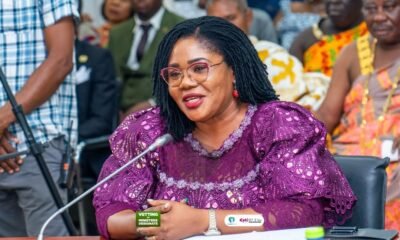Bussiness
Price of LPG goes up by 5% from today

The Liquefied Petroleum Gas (LPG) price will experience a 5% adjustment from today, March 3, 2022.
This follows the restoration of the Price Stabilisation and Recovery Levy (PSRL) on fuel products.
The restored PSRL is ¢0.16 pesewas per litre on petrol, ¢0.14 per litre on diesel, and ¢0.14 per kilogram on LPG.
Experts have warned the restored PSRL and its attendant increase in the price of LPG will further decrease the commodity’s consumption rate and worsen the plight of the ordinary consumer.
LPG is now ¢9.76 per kilogram, translating to about ¢140 for a 14.5 kg cylinder.
The vice president of the LPG Marketers Association, Gabriel Kumi, has blamed the development on the cedi’s poor performance.
According to him, “once the cost keeps moving up and you have constant taxes and levies, you expect that the price will continue to go up.”
In the first pricing window, the price moved from ¢7.89 to ¢8.12 in December 2021. In the second window of January 2022, it went up to ¢8.22.
In the first window of February 2022, the price went up to ¢8.60 and went up again in the second window to ¢9.29.
Currently, the price stands at ¢9.76.
The LPG Marketers Association say the rapid change in prices is affecting their business due to the declining consumption rate of LPG.
“Business is not doing too well because if you look at the statistics, the consumption of LPG is on a serious decline. So if measures are not taken, and the price continues to go up as it is going now, there will be a lot of negative consequences.”
“Today, some of our members have started laying off workers, and we are not growing. The consequences are quite dire,” Gabriel Kumi added.
Government has set an agenda to make the product accessible to many by increasing consumption of the commodity from 25% to 50% by 2030.
But many have argued this objective may not be achievable, considering the speed with which the commodity price is skyrocketing.
Meanwhile, the National Petroleum Authority (NPA) has said it is discussing with the Finance and Energy Ministries to find a manageable solution to the persistent rise in fuel prices.
It says the engagements will largely discuss the possible removal of some taxes on petroleum products.
The Head of Pricing at the National Petroleum Authority (NPA), Abass Ibrahim Tasunti, says the NPA has presented some proposals to Cabinet for consideration.
“We have made some recommendations to the government as to what it can do, but it all depends on the government’s fiscal space. So for us, we look at what can be done to look at the laws available to us.
“Of all the taxes, which one could have been touched? From the law, the Price and Stabilisation and Recovery Levy is the one that could have been used to support the consumer. Our work is to make sure there is fair pricing,” he told JoyNews.
Meanwhile, the Energy Ministry has said Ghanaians will pay back whatever government spends as subsidies.
According to the Deputy Minister, Andrews Agyapa Mercer, this calls for a conversation that ought to be had among stakeholders as the country strives to fashion out a solution to the problem.
“It’s a process that has commenced. The NPA has sent the letter to us, and we’ve forwarded it to the appropriate authorities; it’s going to be deliberated, and then whatever decision is taken is going to be in the best interest of all of us.”
“If that decision is taken that government has to subsidise fuel, we all ought to know that post the issues being resolved, prices coming down, whatever amount of money government would have expended would still have to be paid back by all of us,” he said.
Source: www.myjoyonline.com
Bussiness
Ghana’s GDP shows economy is fast recovering despite DDEP – Finance Ministry

Ghana’s Gross Domestic Product (GDP) indicates a rapid economic recovery despite global challenges and ongoing debt restructuring, according to the Ministry of Finance (MoF).
The Ministry in a statement today indicated that latest data from the Ghana Statistical Service (GSS), cumulative economic growth for the second quarter (Q2) of 2024 reached 6.9%, a notable increase from the 4.7% recorded in the first quarter of 2024.
The MoF statement further noted that, “The economy’s robust recovery is in response to the macroeconomic stability and growth interventions that government is pursuing under our IMF-supported Post Covid-19 Programme for Economic Growth (PC-PEG).”
According to them, the overall real GDP growth for the first half of 2024 rebounded strongly, with year-on-year GDP growth averaging 5.8% for the period, significantly higher than the 2.9% recorded in the same period in 2023.
By Edem Mensah-Tsotorme
Read full statement below


Bussiness
Facebook, Youtube, online trading companies must be taxed – Deputy Finance Minister

The Deputy Finance Minister Dr Alex Ampaabeng, has proposed that online trading companies should be taxed to bolster the economy.
He noted that these companies, both local and international, generate significant revenue from their Ghanaian clients, which underscores the necessity for taxation.
In an interview with Bernard Avle on Channel One TV’s The Point of View, Dr Ampaabeng pointed out various potential revenue sources for Ghana, including online businesses and content creation companies.
He questioned why other national companies operating in Ghana are taxed, but social media platforms like Youtube and Facebook, which run numerous advertisements, are not included in the Ghanaian tax system.
According to him, these social media companies earn profits from the advertisements they display, and online trading companies also generate income from the sale of their products and services.
He mentioned online trading companies such as Jiji, Jumia, and Tonaton, which he believes surpass all physical marketplaces in Ghana in size.
According to him, “I can’t think of a country which has not gotten a digital service tax system of some sort, so Ghana is long overdue. Just to make an example so that people will appreciate where I’m coming from. Go to Youtube and play a video, within one or two minutes, you are going to watch about two, or three adverts.”
“What it tells you is that Facebook or Youtube is making profits right here in Ghana. Go to your Facebook account, and you are going to see a number of adverts on your right, left. What it is telling you is that Facebook is making profits right here in Ghana and not being taxed. Meanwhile, there are companies operating in Ghana, for jurisdiction reasons, of course, that are being taxed,” he said.
The Deputy Minister added that “So then, it comes to the question of the application of our tax laws. Revenues generated in Ghana are subject to taxes. We have Facebook, TikTok and all those players, these are digital platform owners.”
He stressed, “Then we have the digital or market players, here we are talking about individuals who are using the digital platforms. We have Jiji, Jumia, Tonaton, these combined, are bigger than all physical marketplaces in Ghana. And it tells you the volume of transactions, that are going on there.”
He expressed his hope that individuals earning online profits from Ghanaian residents would be taxed.
“There are conversations ongoing, I wouldn’t want to pre-empt anything, maybe in the future, it might not be anytime soon, what I would like to see, is a Ghana where people who are earning all forms of profits in the country are subject to taxes. People who are trading online to Ghanaian residents, people who are generating revenue from Ghana are allowed to pay taxes,” he noted.
Additionally, he proposed a collaboration with the government to curb cybercrime by registering and verifying these online trading companies.
“We can have a system where the government engages these operators, so individuals will submit their Ghana Card and are registered and verified,”he concluded.
Source: Citinewsroom.com







